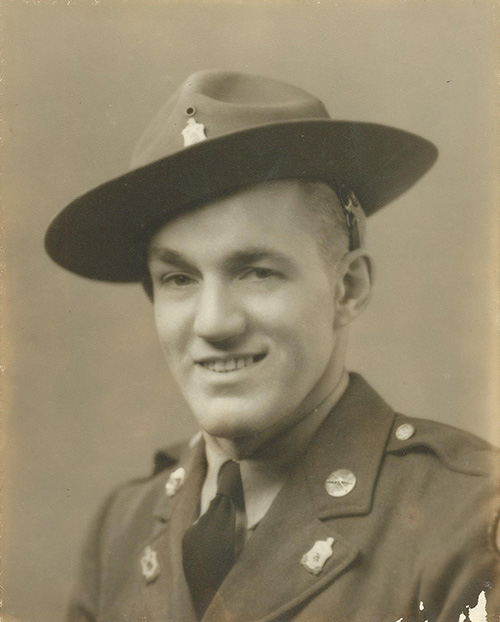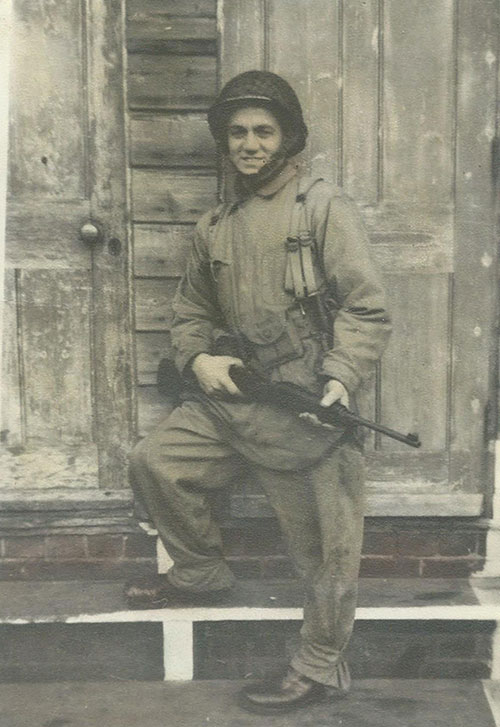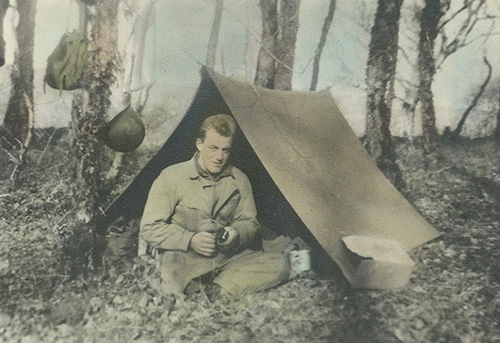
My grandfather, US Army Sergeant Aaron Steltz, was at D-Day
With each footprint they left on the sands of Normandy on June 6, 1944, US soldiers were writing the future of our country. Their mission was to march forward towards the enemy, facing extraordinary danger and the horrors of war as bullets flew over their heads and their friends fell around them. There was no retreat and scarcely any refuge on the open, sandy beaches as they took endless fire from an entrenched, determined enemy.
Just as there could be no retreat from the mission that day, there could also be no retreat from the responsibility that the United States had taken on that reached far beyond the shores of France.
American isolationism, a mainstay of US foreign policy since the founding of the republic which only gained in popularity after WWI, came to an end on D-Day. Prior to WWII, Congress had barred the United States from even joining the League of Nations (a precursor to the United Nations) and had passed Neutrality Acts that codified isolationist policies as law.
These policies had only encouraged Nazi Germany’s rapid advance through Europe, and it was only after the Japanese attack on Pearl Harbor and Germany subsequently declaring war on the United States that our country went to war.
The beginning of the end of Hitler’s reign of terror through Europe started on D-Day, June 6, 1944. My grandfather, US Army Sergeant Aaron Steltz, was there. As his landing craft approached the shores of Normandy, another one nearby was hit by enemy fire and exploded. His survived, and his service in the US Army would take him across Europe and eventually to Germany, where he saw the horrors inflicted by the Nazi concentration camps on the emaciated survivors who were saved by the US Army.

My grandfather, US Army Sergeant Aaron Steltz, serving in Europe during WWII
Those camps were one of many factors that led to a permanent shift in US foreign policy following WWII. No longer would the United States sit idly by and watch other parts of the world descend into chaos and barbarity, or wait until it was nearly too late to act in the interest of national, and international, security. A shift away from isolationist policies also became necessary in a new, post-war era where America needed to compete on the world stage with another emerging superpower, the Soviet Union.
In recent years, following the wars in Iraq and Afghanistan, there has been a growing isolationist sentiment among the American public that is reminiscent of what occurred after WWI. And similar to the period after WWI, US foreign policy has shifted towards isolationism in a way that has had a disastrous effect on international security. The two most notable examples are US inaction on Syria, which has contributed greatly to regional instability in the Middle East and a resurgence of Al Qaeda, and a muted response to Russian expansionism in Ukraine that will have profound consequences for Europe and beyond.
One of the key lessons of WWII, the consequences of isolationism, appears to have been largely forgotten. The United States cannot afford to wait until threats to international security are boiling over before taking action. Europe was nearly lost to fascism in WWII because of a timid, isolationist foreign policy that failed to provide adequate support to the French and British early in the war. The costs of action became much greater later in the war when it became necessary to save Europe through massive national mobilization that would bring to bear the full might of the US military starting on D-Day, June 6, 1944.
Americans should honor the sacrifices made and the victories achieved on D-Day with more than ceremonies and celebrations, but also by continuing forward in the spirit of what our country accomplished on that pivotal day in world history. We must march towards the enemies of freedom with the same courage shown by those men on D-Day no matter how difficult the task or the sacrifices necessary to preserve liberty not only for ourselves, but for others around the world. Just as it was seventy years ago, if America isn’t going to do it, who will? The answer remains the same.

My grandfather, US Army Sergeant Aaron Steltz
